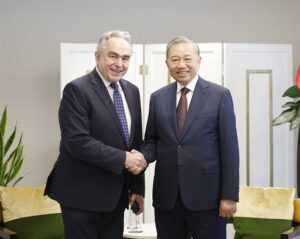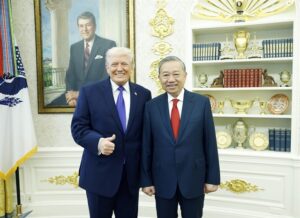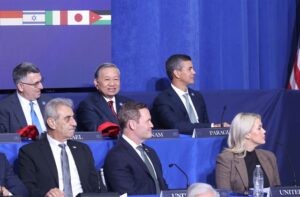VEPR Forecasts Vietnamese Economy to Grow 5.6-6% in 2024

Hanoi, The Gulf Observer: The Việt Nam Institute for Economics and Policy Research (VEPR) has projected that the Vietnamese economy will expand between 5.6% and 6% in 2024, despite ongoing global uncertainties. This forecast was presented by Nguyễn Quốc Việt, VEPR’s Deputy Director, during a policy dialogue held in Hà Nội on Friday.
Nguyễn highlighted that while the Vietnamese economy is on a recovery path, it lacks a robust foundation. He pointed out that key growth drivers such as exports, foreign direct investment (FDI), and industrial production are on the rise. However, domestic demand remains weak and businesses continue to face significant challenges.
“Low credit growth is still clouding the recovery prospects for this year,” Nguyễn stated. He also noted that pressure from foreign exchange rates is contributing to inflation, and soaring domestic gold prices, which are diverging from global prices, pose additional challenges for policymakers.
VEPR’s report on Việt Nam’s economic prospects for 2024 indicates that the economy showed positive signs of recovery in the first quarter, primarily driven by production and export. Nevertheless, the report warns of persistent uncertainties that could hinder steady growth. The Vietnamese economy is expected to grow at the lower end of the Government’s target, with a potential GDP growth rate of 6%. In a worst-case scenario, as forecasted by the World Bank, growth might only reach 5.5%.
According to the report, Việt Nam faces challenges from the US Federal Reserve’s delayed rate cuts, which impact exports and reduce foreign investment. Additionally, ongoing geopolitical tensions worldwide are affecting Việt Nam’s import and export markets and productivity. The report also highlights that production and business sectors are struggling with market, human resources, technology, and capital issues. Other challenges include high inflationary pressure, climate change, drought, flooding, and saltwater intrusion.
Despite these hurdles, Việt Nam has successfully maintained macroeconomic stability. However, limited fiscal resources, due to years of budget deficits and monetary policies tied to inflation and exchange rate targets, restrict Việt Nam from pursuing macroeconomic policies akin to those of other countries.
Nguyễn suggested several measures to accelerate growth, including speeding up public investment spending, particularly on key infrastructure projects. He emphasized the need to prioritize policies that alleviate business difficulties and bolster business confidence. In the long term, improving productivity and competitiveness across industries, enterprises, and the entire economy is crucial for enhancing growth quality.
He also proposed extending the reduction of value-added tax (VAT) until the end of the year and suggested that credit growth be accelerated while ensuring financial system safety. Additionally, diversifying capital-raising channels for enterprises beyond banking credit and completing the national digital transformation strategy were highlighted as important steps.
Hoàng Văn Cường, a member of the National Assembly’s Finance and Budget Committee, underscored the issue of weak domestic demand, noting that private investment remains alarmingly low, and businesses are struggling to access credit. He stressed that ensuring macroeconomic stability should be a priority.
At a discussion session focused on developing a sustainable gold market, Cường pointed out that the domestic gold market is disconnected from the global market due to the SJC-branded gold bar monopoly on import and export. He suggested that the State Bank of Việt Nam’s auctions to increase gold supply, though intended to cool domestic prices, may inadvertently push prices higher.
Nguyễn Minh Tuấn, General Director of AFA Capital, emphasized the need for clear management policies for gold and suggested amending Decree No 24 on managing the gold business to remove the SJC monopoly. He also recommended flexible taxation policies for gold imports and the establishment of a gold depository exchange to improve market transparency.


